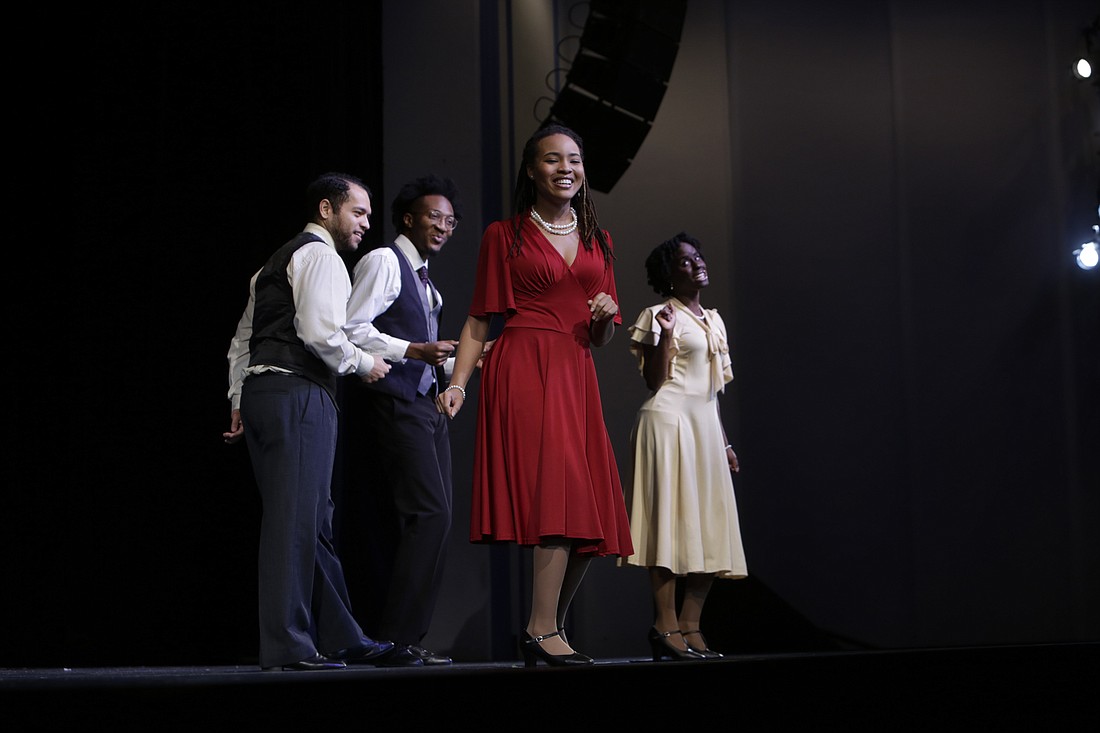- May 3, 2025
-
-
Loading

Loading

On a Thursday morning, the ominous sound of Billie Holiday’s “Strange Fruit” can be heard echoing through three Sarasota County classrooms.
After the final note, Syreeta Banks explains the significance of the song's haunting lyrics and how they relate to the more than 4,700 reported lynchings from 1882 to 1968.
“Those were just the reported lynchings, but there were many, many more that happened,” Banks said.
The performance is part of Jazzlinks, an educational program that through music and theater teaches students about Black contributions to U.S. history.
The program, a collaboration with Westcoast Black Theatre Troupe, Sarasota County Schools and Jazz Club of Sarasota, comes in two iterations taught in rotating years.
The first, which is in cycle for this year, is about the Harlem Renaissance, and the second, which will be presented next year, features contributions from the civil rights movement.
The Harlem Renaissance program touches on the Great Migration, or the relocation of more than 6 million Black Americans from the rural south to northern cities, to Jim Crow laws to the contributions of such artists as Langston Hughes, Cab Calloway and Zora Neale Hurston.
Events the civil rights program focuses on include the 1963 Birmingham church bombing, school marches and segregation. Students hear music from artists including Mahalia and Grant Green.
WBTT writes the scripts in concert with social studies specialists at the school district to make sure they mesh with the curriculum. The programs are given annually in February and March.
High school social studies programs specialist Bernadette Bennett said when administrators began developing the curricula, they started with the music of the time periods then connected the music’s messages with historical documents and various movements from the same time period.
“The performances really help the kids remember the curriculum because we’re coming at it from so many different perspectives,” Bennett said. “We can read the primary source documents and listen to the music, but to have the performances and the dialogue and really bring it to life, it’s incredible for our kids.”
WBTT Founder and Artistic Director Nate Jacobs said the program is aimed to enhance and expose the education of Black arts and culture to students.
“It’s evident that a lot of the African American story, history, culture, contributions are not in the textbooks and are very seldom discussed or celebrated to the extent of white culture,” Jacobs said. “It is our responsibility to propagate our stories not only to the masses, but so young African American children understand where they come from.”
Typically, actors from WBTT visit classrooms to teach the subject matter and then put on a large performance for the students. However, like many in-school programs, COVID-19 took its toll.
WBTT had to rethink its program to make it visually and mentally stimulating over Zoom. WBTT member Travis Ray said staff had to creatively bring together video clips of past performances and rewrite scripts.
However, Ray said Zoom has allowed WBTT to reach larger audiences. By the end of the year, WBTT will have given 35 performances in seven schools, reaching more than 1,660 students. It even is scheduled to perform for students in Kalamazoo, Mich.
“It’s a beautiful thing to reach so many students,” Ray said. “Sometimes when you have a different voice coming in and saying something that they’ve been taught but in a different way with different context, it enhances the student experience.”
Jacobs said it is rewarding to know his company is making an impact in a way that wasn’t available when he was a child.
“The reason why we still are fighting racism in our country is because of lack of knowledge,” Jacobs said. “When there is understanding between the races, there is consistent communication, there is less fear of each other and less division. These programs are helping younger generations understand the differences and make a more inclusive world.”